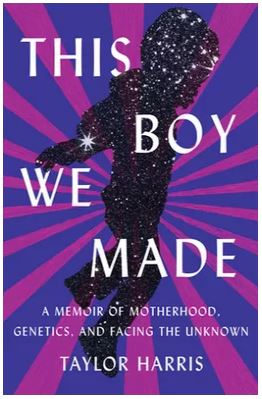
I think most everyone would agree that being an adult is hard. Being a parent – no longer responsible just for yourself but also for the care and well-being of a whole other human being – well, that just adds a new level of stress to adulting. But to be the parent of a sick child? I can’t imagine (and pray I never have to) the constant anxiety and fear that he or she must feel. As someone who likes definitive answers to questions, if that illness was mysterious and amorphous in nature, without a single identifiable cause, that, to me, would be the hardest thing of all. This is the situation that Taylor Harris faced when her 22-month-old son Christopher (Tophs for short) woke up one morning unusually lethargic – awake, but with the listless, vacant eyes of a living doll. Harris details this new reality – the After – as a parent of a sick child, as an adult suffering from anxiety and depression, as an advocate for a son whose health issues baffled even the medical specialists – in the beautifully written new book This Boy We Made: A Memoir of Motherhood, Genetics, and Facing the Unknown.
Harris writes that, when she was a baby, her case of separation anxiety was so extreme that her mother had to quit her job to stay home with her. When she got older, Harris experienced physical manifestations, like the feeling that her heart was pounding out of her chest, spiraling thoughts of doom that induced panic attacks, and unceasing fears that looped through her brain to a debilitating degree. It wasn’t until Harris began to take anxiety medication and practice cognitive behavioral skills learned in therapy that she was finally able to control her thoughts. Despite having a better handle on her anxiety in adulthood, the morning that Tophs wakes listless, Harris’ own medical history causes her to question her mother’s intuition: is this the anxiety causing her to overreact, or does Tophs need immediate medical attention?
Through the months and years, Tophs undergoes countless visits to doctors and specialists, blood tests, genetic tests, EEGs, EKGs, MRIs, and whole exome sequencing; even after all that, there’s no single diagnosis that can explain the sudden dropping of blood glucose levels, and, later, the seizures and the developmental/processing delays that Tophs experiences. Harris laments, “as much as I can despise my anxiety and dream of a life without it, I can at least always find a home in my diagnosis… I’ve wanted that same home for my son.” However, during their search for answers, ancillary genetic testing of Harris and her husband does end up revealing important information about Taylor’s own medical profile that she would never have known otherwise, leading her mother to muse that Tophs is a sort of angel delivered to save them.
I don’t know how to tell you about the intersection of these burdens – Black and undiagnosed – in a world that is comfortable with neither.
Taylor Harris in This Boy We Made

Not only is this book about the medical mystery surrounding Tophs, but also Taylor and her husband’s experiences of being educated and black, living in the south, fighting for answers from the medical establishment, and encountering roadblocks while advocating for special educational interventions for Tophs. While most of us will never know what it is to live with the weight of these burdens, the fear and guilt that seem to go hand in hand with parenthood are something any mother can relate to: Is it something Taylor did or didn’t do that was responsible for Tophs’ medical issues? Was it the anti-anxiety medication she continued to take throughout her pregnancy? Was it the time she stepped away for a split second and Tophs rolled off the bed?
There is the way that we hope things to be, and then there is the way that things actually are. Harris uses the two bedrocks in her life – her faith and her husband – to let go of expectations and bask in her love for Tophs and in her belief that the child she and her husband made together is perfect because he is exactly the person that he was meant to be. There is an unburdening that can be found for us all in this lesson of love and acceptance – in parenthood, and in life.
Discover more from Cook Memorial Public Library District
Subscribe to get the latest posts sent to your email.
Categories: Books and More
Tags: Books and More
